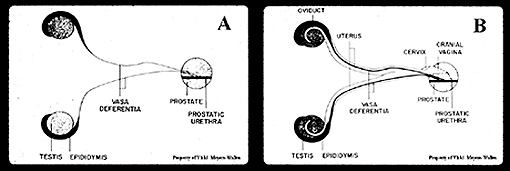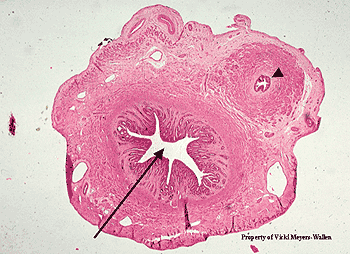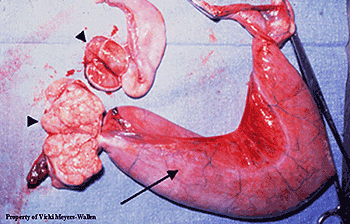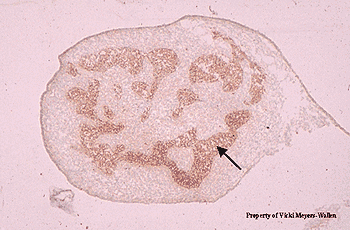PDMS
Vicki Meyers-Wallen, VMD, PhD, Diplomate ACT —
Inherited Disorders of the Reproductive Tract
ASSOCIATE PROFESSOR OF GENETICS AND REPRODUCTION
1. Persistent Mullerian Duct Syndrome (PMDS)
DNA TEST FOR THE MINIATURE SCHNAUZER – information for breeders
Several cases of PMDS in Miniature Schnauzers have been reported in the USA and Europe over the past 20 years. We have developed a DNA test for Persistent Mullerian Duct Syndrome (PMDS) in the Miniature Schnauzer. In addition to determining which dogs are affected or carriers, this test can also determine which males and females are free of the mutation, and thus are clear for breeding. Routine testing would reduce the frequency of this mutation, allowing PMDS to be eliminated from the Miniature Schnauzer breed. Our laboratory previously determined that PMDS in this breed is inherited as a sex-limited autosomal recessive trait and we recently reported the causative mutation (Journal of Andrology 2009). The article is freely available through Pub Med Central (see sidebar, Publications).
Health problems due to PMDS
The problem is that a uterus develops in male Miniature Schnauzers that carry two copies of the PMDS mutation. (Yes, a male with a uterus!) Because approximately 50% of PMDS males look normal externally, they are not identified by experienced breeders or through regular physical examination by veterinarians. Such dogs are fertile and all of their offspring are obligate carriers. These dogs are rarely diagnosed as having PMDS until health problems arise. Only after the diagnosis of PMDS is made is it clear that both of his parents are carriers. By then the affected dog and his parents have usually produced more offspring. The other 50% of PMDS males also look like males externally but additionally have cryptorchidism (failure of one or both testes to descend into the scrotum). The uterus is sometimes identified when these cryptorchid PMDS males are neutered. If they are not neutered, tumors often develop in the undescended testes. The major life threatening health problem for all PMDS males is development of uterine infection (pyometra), which can arise in young or old dogs. Delay in diagnosis of pyometra and PMDS is common, as neither the owner, breeder or veterinarian is expecting a uterine infection in a male dog. Repeated urinary tract infections can also occur. All PMDS dogs and carriers can be diagnosed by DNA testing as pups and prior to developing pyometra, urinary tract infections or testicular tumors.
Which dogs should be tested?
The DNA test can identify all Miniature Schnauzers that carry this PMDS mutation, including carrier males and females, as well as affected males. Females can carry one or two copies of the mutation with no health consequences, but can pass the mutation to their offspring. Male carriers have one copy of the mutation and are fertile. PMDS males have two copies of the mutation, thus all of their offspring will receive the mutation. Certainly any dog that is related to a known PMDS male should be tested: siblings, grandparents, aunts, uncles, and so forth. Testing the parents will determine whether they carry one or two copies of the mutation. Such testing will also allow the breeder to identify which dogs are clear of the mutation, allowing the line to be further perpetuated from them. Remember that it is difficult to identify PMDS dogs without DNA testing. Therefore, even if PMDS has not yet been identified in a particular line, it is prudent to test at least the foundation males and females to be certain that the line is clear. Subsequently, any dog that is not known to be PMDS clear should be tested before it is bred into a clear line. Contact Dr. Vicki Meyers-Wallen if you want to test your dogs or if think you have an affected dog. We can assist you and your veterinarian with diagnosis, genetic testing and genetic counseling. The contact information is: E-mail: vnm1@cornell.edu, telephone: 607 256 5683. All information will be kept in strictest confidence.
Persistent Mullerian Duct Syndrome (PMDS)- information for clinicians/researchers
Persistent Mullerian Duct Syndrome has been reported in Miniature Schnauzers in the USA and Europe and in Basset Hounds in Europe. In collaboration with others, our laboratory identified the causative mutation in the Miniature Schnauzer (Wu et al. 2009. J Androl, Pub Med PMID in process, see sidebar, Publications). Affected Miniature Schnauzers are XY males with bilateral testes, oviducts, uterus and cranial vagina in addition to epididymides, vasa deferentia, and the prostate gland. No abnormalities have been detected in homozygous or heterozygous females. PMDS in Miniature Schnauzers is inherited as a sex-limited autosomal recessive trait.

Diagram of normal male organs (A) and organs found in PMDS affected dogs (B).
Approximately 50% of PMDS Miniature Schnauzers have unilateral or bilateral cryptorchidism. The undescended testes do not produce sperm, and can develop tumors. However 50% of PMDS Miniature Schnauzers have NORMAL testis descent and thus veterinarians may not suspect PMDS. These dogs are not diagnosed by routine physical examination, are fertile, and their offspring are obligate carriers of the mutation.

Cross section of the uterine horn (arrow) and vas deferens (arrowhead) from a PMDS affected dog.

High power microscopic view of seminiferous tubules in testes from a PMDS affected dog. A. The cryptorchid testis has only Sertoli cells (arrow) and no sperm producing cells in the tubules. B. The descended testis has Sertoli cells and developing sperm cells in the tubule.
Health problems
All PMDS males are subject to associated health problems of urinary tract infections and/or pyometra, which are potentially fatal. The veterinarian is unlikely to suspect pyometra in a dog that looks like a male, and this can cause delay in diagnosis. Signs of polydipsia, polyuria, fever, hematuria or pyuria in male Miniature Schnauzers should prompt further diagnostic procedures such as ultrasonography and contrast radiography. The uterus and vagina may be misdiagnosed as large prostatic cysts through such procedures, but surgical exploration and histopathology will confirm PMDS. Since PMDS dogs should be prevented from producing offspring, surgical treatment for PMDS should include hysterectomy and castration. Note that the proximal uterine horns are attached to the testes and the vagina terminates in the dorsal prostate. If the vagina is distended and infected, it may require marsupialization, using methods similar to those employed for prostatic cysts.

Infected uterus (pyometra) removed from a PMDS affected dog. Arrow indicates one uterine horn that is very dilated by fluid accumulation. Testes (cut in half) are indicated by arrowheads. The larger testis contains a tumor.
Molecular pathogenesis
In normal male development, the structure that can develop into the uterus (Mullerian or Paramesonephric ducts) disintegrates under the influence of a hormone secreted by the embryonic testis. This hormone is called Mullerian Inhibiting Substance (MIS) or Anti-Mullerian hormone (AMh). Our studies showed that MIS mRNA and protein are produced by the testes of PMDS affected embryos during the entire embryonic critical period for Mullerian duct regression (Day 34-36 of a 65 day gestation).

Low power microscopic view of a testis from a PMDS affected canine embryo. Arrow indicates seminiferous tubule staining positive for MIS protein.
Using bioassays we showed that the MIS produced by PMDS dogs is biologically active. Therefore we suspected that the cause of PMDS in the Miniature Schnauzer was a defect in the MIS receptor. Subsequently, in collaboration with others we identified the causative mutation as a single base pair substitution in MISRII that introduces a stop codon in exon 3. This results in an mRNA transcript that is 243 rather than 1806 nucleotides. The homozygous mutation terminates translation at 80 amino acids, eliminating much of the extracellular domain and the entire transmembrane and intracellular signaling domains of the receptor. Therefore it is likely that the MIS type II receptor is completely dysfunctional in PMDS Miniature Schnauzers.
2. SRY-negative XX sex reversal (XXSR)
SRY-negative XX sex reversal is an inherited disorder that causes infertility and sterility in some breeds of purebred dogs. At present, this inherited disorder is well documented in the following breeds in the USA:
American and English cocker spaniels
Beagle